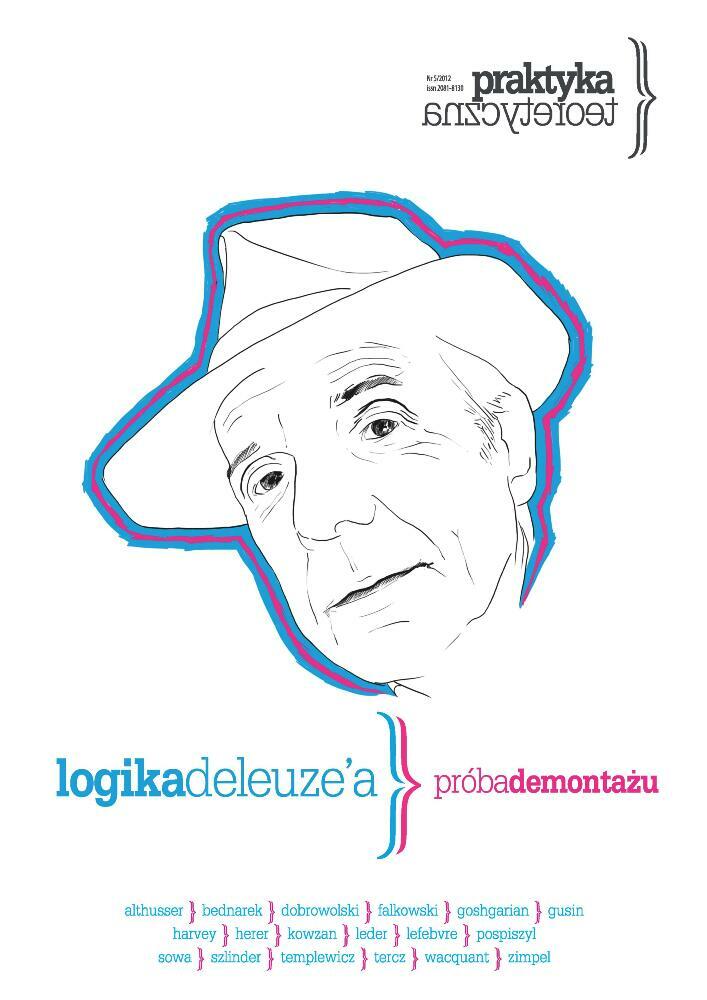Abstract
The article is committed to the aim of reconstruction of the notion of
immaterial/biopolitical labor in the context of its affinities with Deleuze and Guattari’s
notion of desiring-production. Hardt and Negri’s controversial thesis of the
autonomization of biopolitical labor from capitalist command as the basis for the
political emancipation of the working class/multitude is also discussed and compared
with Deleuze and Guattari’s vision of becoming-minoritarian as the only viable
anti-capitalist politics.
Funding
biopolitics
production
operaismo
immaterial labor
Negri
Hardt
References
Agamben G. 2010. Czym jest lud?. W Agamben: przewodnik Krytyki Politycznej. Warszawa: Wydawnictwo Krytyki Politycznej.
Balibar E. 2007. Filozofia Marksa. Warszawa: Książka i Prasa.
Bowring F. 2004. “From the Mass Worker to the Multitude: a Theoretical Contextualization of Hardt and Negri’s Empire”. Capital&Class 28 (2) : 101-132.
Callinicos A. 2007. Antonio Negri and the Temptation of Ontology. W The Philosophy of Antonio Negri 2: Revolution in Theory. London-Ann Arbor: Pluto Press.
Dyer-Witheford N. 2005. Cyber-Negri: General Intellect and Immaterial Labor. W The Philosophy of Antonio Negri 1: Resistance in Practice. London-Ann Arbor: Pluto Press.
Green P. 2002. “‘The Passage from Imperialism to Empire’: a Commentary on Empire by Michael Hardt and Antonio Negri”. Historical Materialism 10 (1) : 29-77.
Hardt M., Negri A. 1991. Marx Beyond Marx: Lessons on the Grundrisse. New York-London: Pluto Press.
Hardt M., Negri A. 2003. Labor of Dionysus: a Critique of the State-Form. Minneapolis: University of Minnesota Press.
Hardt M., Negri A. 2004. Multitude. London: Penguin Books.
Hardt M., Negri A. 2005. Imperium. Warszawa: W.A.B..
Hardt M., Negri A. 2009. Commonwealth. Cambridge: Harvard University Press.
Klein N. 2008. Doktryna szoku. Warszawa: Muza.
Lazzarato M. 2006. The Concepts of Life and the Living in the Societies of Control. W Deleuze and the Social. Edinburg.
Marx K. 1973. Grundrisse. London. http://www.marxists.org/archive/marx/works/1857-gru/index.html.
Negri A. 2008. Goodbye Mr. Socialism. Warszawa: W.A.B..
Panzieri R. 2007. Renesans Operaismo. W Autonomia robotnicza. Poznań: Bractwo Trojka.
Panzieri R. 2010. Socialist Uses of Worker’s Inquiry. http://www.generation-online.org/t/tpanzieri.html.
Rancière J. 2008. Na brzegach politycznego. Kraków: Korporacja Ha!art.
Sassen S. 2007. Globalizacja: eseje o nowej mobilności ludzi i pieniędzy. Kraków: Wydawnictwo Universytetu Jagiellońskiego.
Shukin N. 2009. Animal Capital: Rendering Life in Biopolitical Times. Minneapolis: University of Minnesota Press.
Silver B. J. 2009. Globalny proletariat: ruchy pracownicze i globalizacja po 1870 r.. Warszawa: Bractwo Trojka.
Sunder Rajan K. 2006. Biocapital: the Constitution of Postgenomic Life. Durham: Duke University Press.
Thoburn N. 2001. “Autonomous Production?: On Negri’s ‘New Synthesis’”. Theory. Culture and Society 18 (5) : 75-96.
Thoburn N. 2003. Deleuze. Marx and Politics. London-New York. http://libcom.org/library/deleuze-marx-politics-nicholas-thoburn-intro.
Thompson P. 2005. “Foundation and Empire: a Critique of Hardt and Negri”. Capital&Class 29 (2) : 73-98.
Toscano A. 2007. ‘Always Already Only Now’. W The Philosophy of Antonio Negri 2: Revolution in Theory. London-Ann Arbor: Pluto Press.
Tronti M. 2010. Workers and Capital. http://www.geocities.com/cordobakaf/tronti_workers_capital.html.
Weeks K. 2005. The Refusal of Work as Demand and Perspective. W The Philosophy of Antonio Negri 1: Resistance in Practice. London-Ann Arbor: Pluto Press.
License
“Theoretical Practice” seeks to put into practice the idea of open access to knowledge and broadening the domain of the commons. It serves the development of science, thinking and critical reflection. The journal is published in open-access mode under the CC-BY-NC-SA 4.0 license (detail available here: http://creativecommons.org/licenses/by-nc-sa/4.0/). Articles published in the journal may be freely distributed, stored, printed and utilized for academic and teaching purposes without restrictions.
They should not be, however, used for any commercial purposes or be reconstructed into derivative creations. Access to the journal may not be limited or offered for a fee by any third party.
Prospective authors are obliged to fill in, sign and send back the publishing contract compliant with the CC licencing. [PL.pdf, PL.doc, EN.pdf,EN.doc].
According to this contract, authors grant the journal a non-exclusive right to publish their work under the creative commons license (CC-BY-NC-SA 4.0) without any financial obligation on both sides of the contract.
Before submission authors should make sure that derivative materials they use are not protected by copyright preventing their non-commercial publication. Authors are responsible for any respective copyright violations.
